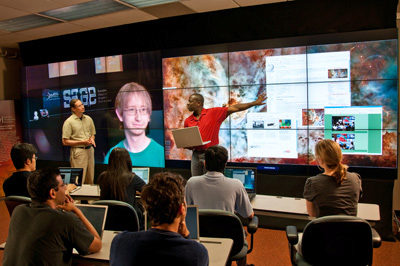UIC’s EVL Makes Global Science Networking More User Friendly
September 23rd, 2009
Categories: Applications, Devices, Government, Networking, Software, Supercomputing, Tele-Immersion, Visualization, VR

About
The September 2009 issue of the Illinois Science & Technology Coalition’s online ISTC Catalyst newsletter features examples of technology research taking place at Illinois-based universities and Argonne National Laboratory. UIC’s Electronic Visualization Laboratory has both an article on its latest NSF grant, and a video explaining its SAGE software and LambdaVision tiled display.
Making Global Science Networking More User-Friendly
Paul Francuch
University of Illinois at Chicago Office of Public Affairs
Scientists working collaboratively, at the same time, but in different locations around the world, can now do so thanks to ultra-high-speed, broadband networks and special software developed as part of a National Science Foundation-funded program called the “OptIPuter.”
But to make it work, they often need technical support people standing by.
Computer scientists at the University of Illinois at Chicago’s Electronic Visualization Laboratory - a key partner in the OptIPuter project - think the process should be more user-friendly. NSF has just awarded the UIC team a three-year, $1.9 million grant to make it happen.
EVL experts were instrumental in creating software that allows scientists gathered in remote locations to load huge amounts of digitalized data from supercomputers and visualize images, graphs or anything else on ultra-high-resolution, wall-sized display panels. Scientists at any participating site can manipulate that data, simulate, compare and learn things from this shared experience. Nearly 40 OptIPuter research centers around the globe, called OptIPortals, have been tested over the past few years and work very well.
“What we want to do now is turn this from a research project into a product people can easily use,” said EVL member Andrew Johnson and associate professor of computer science at UIC. “We’re really trying to ‘harden’ the software.”